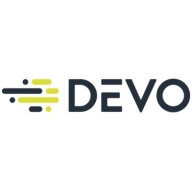

Datadog and Devo are prominent in the monitoring solutions category, offering powerful capabilities for managing complex infrastructures. Datadog seems to have an advantage due to its extensive third-party integrations and ease of use in capturing metrics and logs, particularly suited for cloud-native work.
Features: Datadog is appreciated for robust third-party integrations, centralized dashboards, and capturing metrics, logs, and traces efficiently. Devo is recognized for its powerful real-time analytics, multi-tenant architecture, and ability to support complex queries across diverse data sources, enhancing user experience through speed and efficient data handling.
Room for Improvement: Datadog users seek enhancements in menu navigation, integration with security tools, and pricing model adjustments. Devo is encouraged to improve parser capabilities and diversify pricing based on metadata, as well as extend integrations with third-party cloud and SaaS systems.
Ease of Deployment and Customer Service: Datadog offers a straightforward deployment process suitable for cloud and hybrid environments, but experiences mixed reviews for customer service responsiveness. Devo provides customer-focused support simplifying setup, receiving praise for proactive engagement enhancing user satisfaction.
Pricing and ROI: Datadog's usage-based pricing is higher with cost justified by functionality, beneficial to larger companies capable of cost absorption. Devo's data ingestion-based straightforward pricing is seen as more predictable, offering better ROI with 400 days of data retention. Datadog's complexity meets extensive needs while Devo offers simpler pricing and robust features beneficial for real-time data processing without high additional costs.
Previously we had thirteen contractors doing the monitoring for us, which is now reduced to only five.
Datadog has delivered more than its value through reduced downtime, faster recovery, and infrastructure optimization.
I believe features that would provide a lot of time savings, just enabling you to really narrow down and filter the type of frustration or user interaction that you're looking for.
When I have additional questions, the ticket is updated with actual recommendations or suggestions pointing me in the correct direction.
Overall, the entire Datadog comprehensive experience of support, onboarding, getting everything in there, and having a good line of feedback has been exceptional.
I've had a couple instances where I reached out to Datadog's support team, and they have been really super helpful and very kind, even reaching back out after resolving my issues to check if everything's going well.
Datadog's scalability has been great as it has been able to grow with our needs.
We did, as a trial, engage the AWS integration, and immediately it found all of our AWS resources and presented them to us.
Datadog's scalability is strong; we've continued to significantly grow our software, and there are processes in place to ensure that as new servers, realms, and environments are introduced, we're able to include them all in Datadog without noticing any performance issues.
Datadog is very stable, as there hasn't been any downtime or issues since I've been here, and it's always on time.
Datadog seems stable in my experience without any downtime or reliability issues.
These incidents are related to log service, indexes, and metric capturing issues.
It would be great to see stronger AI-driven anomaly detection and predictive analytics to help identify potential issues before they impact performance.
The documentation is adequate, but team members coming into a project could benefit from more guided, interactive tutorials, ideally leveraging real-world data.
In future updates, I would like to see AI features included in Datadog for monitoring AI spend and usage to make the product more versatile and appealing for the customer.
This is particularly evident when dealing with failed login attempts and determining true versus false positives.
The setup cost for Datadog is more than $100.
Everybody wants the agent installed, but we only have so many dollars to spread across, so it's been difficult for me to prioritize who will benefit from Datadog at this time.
My experience with pricing, setup cost, and licensing is that it is really expensive.
Our architecture is written in several languages, and one area where Datadog particularly shines is in providing first-class support for a multitude of programming languages.
Having all that associated analytics helps me in troubleshooting by not having to bounce around to other tools, which saves me a lot of time.
Datadog was able to find the alerts and trigger to notify our team in a very prompt manner before it got worse, allowing us to promptly adjust and remediate the situation in time.
When they see a spike in a line chart for a failed login, which could be a true or false attempt, they can click that spike, and a table widget on the same active board instantly populates with raw logs of data for those specific failed logins.
| Product | Market Share (%) |
|---|---|
| Datadog | 5.7% |
| Devo | 0.7% |
| Other | 93.6% |


| Company Size | Count |
|---|---|
| Small Business | 80 |
| Midsize Enterprise | 46 |
| Large Enterprise | 94 |
| Company Size | Count |
|---|---|
| Small Business | 8 |
| Midsize Enterprise | 4 |
| Large Enterprise | 11 |
Datadog integrates extensive monitoring solutions with features like customizable dashboards and real-time alerting, supporting efficient system management. Its seamless integration capabilities with tools like AWS and Slack make it a critical part of cloud infrastructure monitoring.
Datadog offers centralized logging and monitoring, making troubleshooting fast and efficient. It facilitates performance tracking in cloud environments such as AWS and Azure, utilizing tools like EC2 and APM for service management. Custom metrics and alerts improve the ability to respond to issues swiftly, while real-time tools enhance system responsiveness. However, users express the need for improved query performance, a more intuitive UI, and increased integration capabilities. Concerns about the pricing model's complexity have led to calls for greater transparency and control, and additional advanced customization options are sought. Datadog's implementation requires attention to these aspects, with enhanced documentation and onboarding recommended to reduce the learning curve.
What are Datadog's Key Features?In industries like finance and technology, Datadog is implemented for its monitoring capabilities across cloud architectures. Its ability to aggregate logs and provide a unified view enhances reliability in environments demanding high performance. By leveraging real-time insights and integration with platforms like AWS and Azure, organizations in these sectors efficiently manage their cloud infrastructures, ensuring optimal performance and proactive issue resolution.
Devo is the only cloud-native logging and security analytics platform that releases the full potential of all your data to empower bold, confident action when it matters most. Only the Devo platform delivers the powerful combination of real-time visibility, high-performance analytics, scalability, multitenancy, and low TCO crucial for monitoring and securing business operations as enterprises accelerate their shift to the cloud.
We monitor all Log Management reviews to prevent fraudulent reviews and keep review quality high. We do not post reviews by company employees or direct competitors. We validate each review for authenticity via cross-reference with LinkedIn, and personal follow-up with the reviewer when necessary.